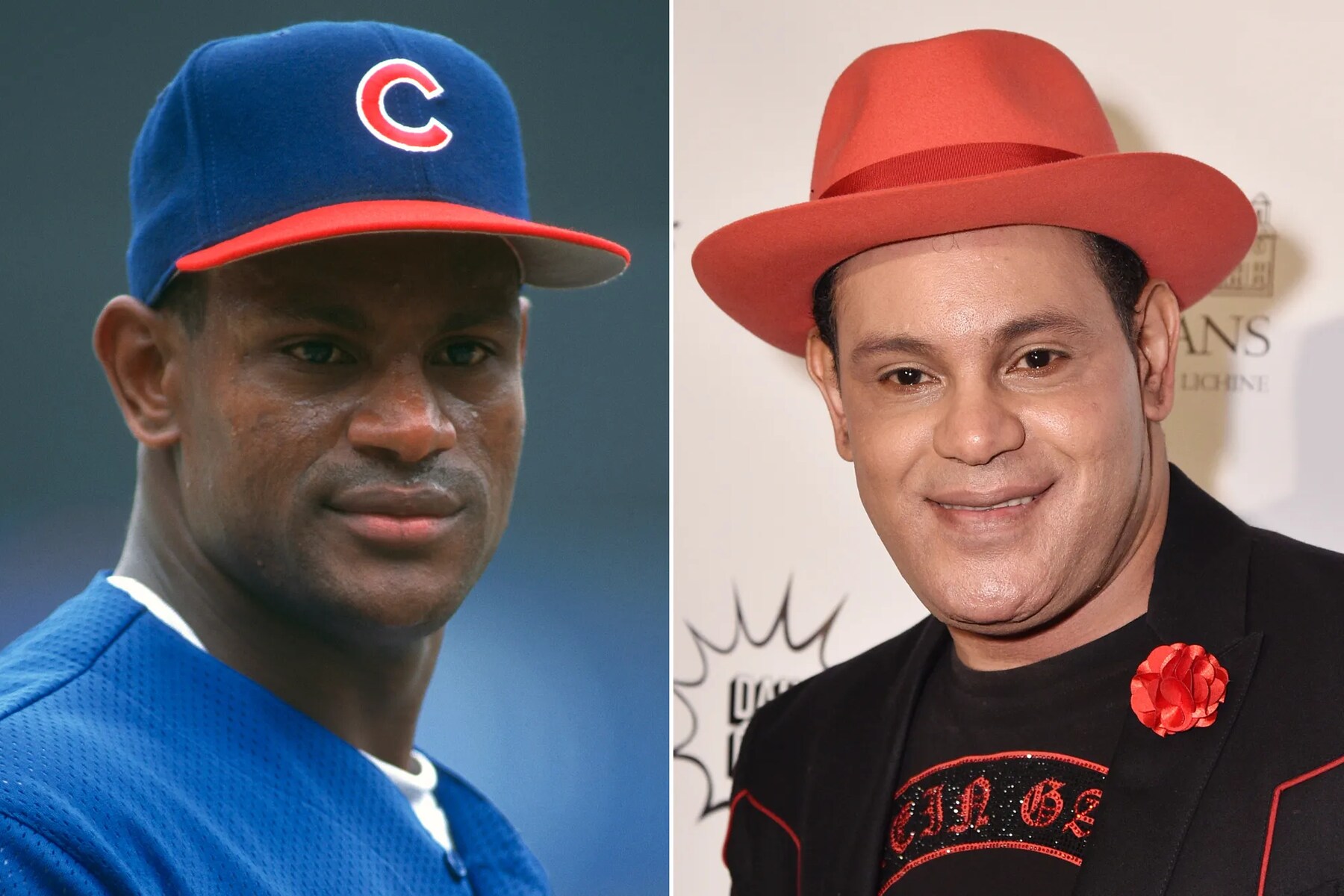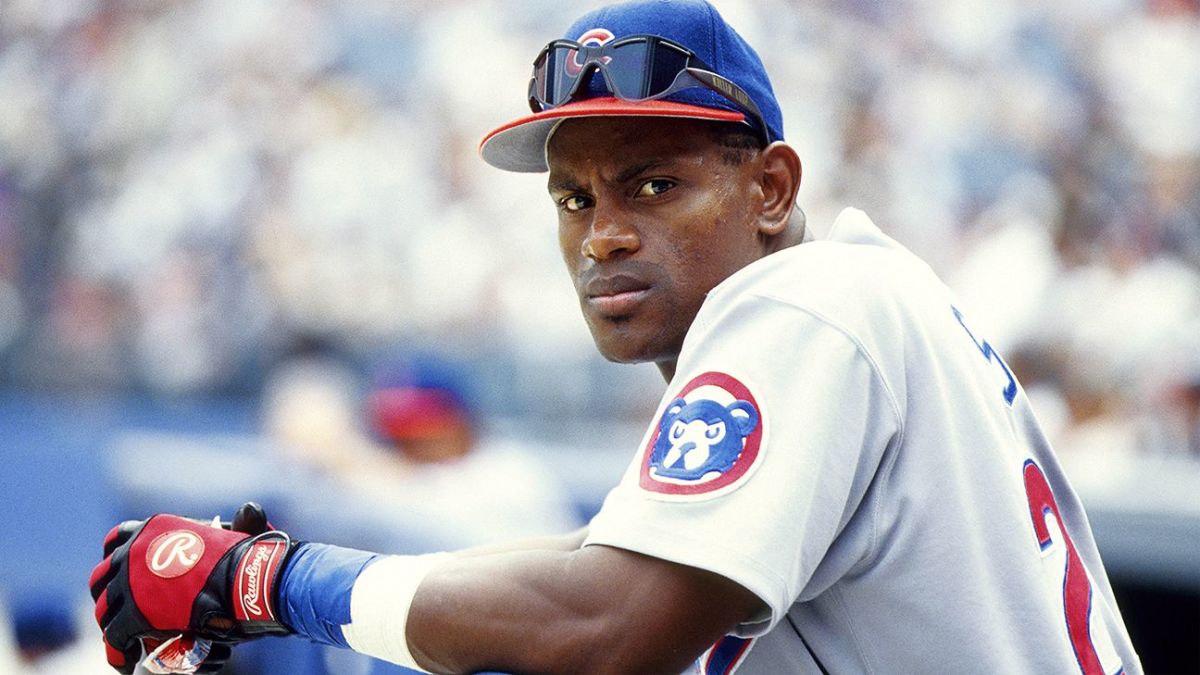Who is Sammy Sosa, beyond the iconic home run hitter and the subject of so much speculation? Sammy Sosa, the Dominican slugger who once captivated baseball fans with his prodigious power, is a figure of undeniable talent, complex controversies, and enduring legacy within the sport.
Samuel Peralta Sosa, the man known to the world as Sammy, was a dominant force in Major League Baseball for nearly two decades. His name, forever etched in baseball lore, conjures images of towering home runs, electrifying speed, and the raw exuberance that made him a fan favorite. From his early days with the Texas Rangers and Chicago White Sox to his prime years as a Chicago Cub, Sosa consistently delivered thrilling performances, captivating audiences and rewriting the record books. However, his career was also marked by controversy, particularly regarding allegations of performance-enhancing drug use, which continues to shape perceptions of his accomplishments and legacy.
His appearance, too, has been the subject of significant scrutiny, especially the apparent lightening of his skin tone in the years following his retirement. These changes have spurred ongoing discussions and debates among the public and his fans.
- Cut Micro Bangs The Ultimate Guide To Transforming Your Look
- 99 Cent Store Headphones Are They Worth The Hype
| Attribute | Details |
|---|---|
| Full Name | Samuel Kelvin Peralta Sosa |
| Nickname | Sammy Sosa |
| Date of Birth | November 12, 1968 |
| Birthplace | San Pedro de Macors, Dominican Republic |
| Height | 6 ft 0 in (1.83 m) |
| Weight | 225 lb (102 kg) |
| Position | Right Fielder |
| Teams Played | Texas Rangers (1989-1991), Chicago White Sox (1989-1991), Chicago Cubs (1992-2004), Baltimore Orioles (2005) |
| Batting Average | .273 |
| Home Runs | 609 |
| RBIs | 1,667 |
| Runs Scored | 1,475 |
| Hits | 2,408 |
| Awards | 1998 NL MVP, 6-time Silver Slugger Award Winner |
| MLB Debut | June 16, 1989 |
| Retirement | 2005 |
| Steroid Era | Key Figure |
| Notable Feat | Only player to hit 60 home runs in a season three times (1998, 1999, 2001) |
| Reference | MLB.com Player Profile |
The late 1990s were a golden age for baseball, fueled by the electrifying home run chase between Sosa and Mark McGwire. This captivating rivalry captivated fans, revitalizing the sport after a period of decline. Sosa, with his infectious enthusiasm and prodigious power, became a central figure in this narrative, his home runs serving as pivotal moments in the season and beyond. In 1998, he and McGwire captured the attention of the nation as they raced to break Roger Maris' single-season home run record. While McGwire ultimately claimed the title with 70 home runs, Sosa's 66 homers that season were a testament to his incredible skill and athleticism. The race with McGwire became an epic showdown.
The Chicago Cubs, the team with whom Sosa spent the majority of his career, were often the epicenter of Sosa-mania. His infectious energy and dazzling performances made him a favorite among the Wrigley Field faithful. The team's spring training games and regular season contests alike were elevated by his presence. He would often be seen in the dugout for the team's spring training, with the most recent being in March. His contributions to the team extended beyond the field as he reconnected with his former team.
Sosa's career statistics are, in a word, staggering. His power numbers, including 609 career home runs, are among the best in the history of the game. He holds the distinction of being the only player to hit 60 home runs in a season three times, a feat that underscores his exceptional talent. He also drove in 1,667 runs, scored 1,475 runs, and recorded 2,408 hits. His contributions were recognized with accolades, including the 1998 National League MVP Award and six Silver Slugger Awards. The numbers tell a story of dominance and consistency.
- Dank Tell The Ultimate Guide To Understanding This Trendy Slang
- How To Say Pijama Or Pijama A Comprehensive Guide For Language Enthusiasts
However, the narrative surrounding Sosa is not without its complexities. His career coincided with what is widely known as the "Steroid Era" in baseball, a period defined by the prevalence of performance-enhancing drugs. While Sosa has consistently denied using such substances, the questions surrounding his rapid physical transformation and the dramatic increase in home run totals have led to persistent skepticism and doubt. This controversy has arguably denied him a place in the Hall of Fame, as the voters have been hesitant to enshrine players associated with PED use.
In recent years, Sosa has made efforts to reconnect with the Cubs organization and the city of Chicago. He has made appearances at Cubs events, including spring training games and other gatherings. These appearances represent a move towards reconciliation, healing old wounds, and embracing the nostalgia associated with his remarkable career. He has issued a public apology to the team as well, a gesture that signifies a desire to repair the fractured relationship with the franchise.
Adding another layer to the complex narrative surrounding Sosa is the noticeable change in his physical appearance, particularly the apparent lightening of his skin tone. This transformation, which has been the subject of intense public discussion, has been attributed to a skin condition. Regardless of the cause, the change in his appearance has contributed to the mystique that surrounds the former baseball star.
Before his time with the Cubs, Sosa played with the Texas Rangers and Chicago White Sox, and his early career was a gradual progression. He was traded to the Cubs in 1992, a move that would change the trajectory of his career. It was with the Cubs that he truly blossomed, transforming into one of baseball's most exciting and prolific hitters.
Beyond the statistics and controversies, Sammy Sosa is a figure who embodies the highs and lows of professional sports. He provided the public with a sense of excitement and enthusiasm for the game and still does to this day. As he revisits his past with the Cubs and reflects on his future, the legacy of Sammy Sosa is sure to continue to be a topic of discussion and debate among baseball fans for years to come.
Sosa's story is also a testament to the evolution of baseball. His career mirrors the dramatic shifts that occurred in the sport during the late 20th and early 21st centuries. From the home run races of the 1990s to the ongoing debates about PEDs, Sosas journey reflects the broader changes in the game.
The legacy of Sammy Sosa is one of incredible highs, dramatic lows, and an enduring impact on the sport of baseball. While the controversies of his career will continue to be debated, his contributions to the game and the entertainment he provided will be remembered by fans for generations to come. The ongoing process of reconciliation with the Cubs and his reflections on the past suggest that he is embracing a new chapter, marked by humility, faith, and a desire to look toward the future.
- Corium Inversiones Honduras A Deep Dive Into Investment Opportunities In Central America
- How To Prepare Chamoy For Selling A Stepbystep Guide


